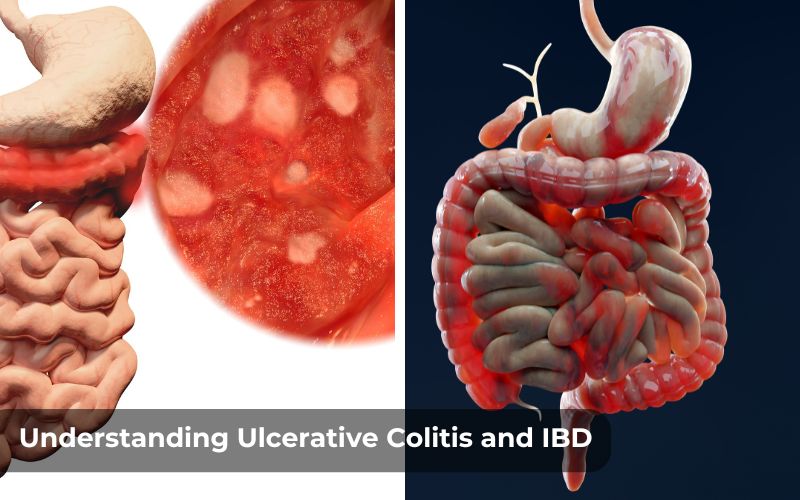Ulcerative colitis is a chronic form of inflammatory bowel disease (IBD) that causes inflammation and ulcers in the large intestine, also known as the colon. It is characterized by periods of remission and flare-ups, during which individuals experience symptoms such as abdominal pain, bloody diarrhea, and rectal bleeding.
The exact cause of ulcerative colitis is unknown, but it is believed to involve an abnormal immune response against the cells of the digestive tract. Genetics may play a role, as individuals with a family history of the condition are at a higher risk. The disease can affect people of all ages, but it is most commonly diagnosed in teenagers and young adults.
Ulcerative colitis is characterized by inflammation that stays localized to the mucosa, the inner lining of the colon. Unlike Crohn’s disease, which can affect any part of the digestive tract, ulcerative colitis primarily affects the large intestine.
The inflammation typically starts in the rectum and can spread to other parts of the colon in a continuous pattern. This differentiates it from Crohn’s disease, which can cause patchy inflammation in various areas of the digestive tract.
The immune system plays a significant role in ulcerative colitis, as it mistakenly attacks the healthy cells in the colon, leading to chronic inflammation and the formation of ulcers.
This immune response can cause various symptoms and complications, impacting the quality of life of individuals with the condition.
Key Highlights
- Ulcerative colitis is a form of inflammatory bowel disease that causes chronic ulcers in the large intestine, leading to symptoms such as abdominal pain, bloody diarrhea, and rectal bleeding.
- Treatment options for ulcerative colitis include medications like biologics and corticosteroids, as well as surgical interventions like colectomy and ileostomy.
- Managing ulcerative colitis involves making lifestyle changes such as dietary modifications, regular exercise, and stress reduction techniques to improve quality of life.
- It is to recognize potential complications associated with ulcerative colitis, such as colon cancer, anemia, and thromboembolism, and take preventative measures through regular check-ups and medication adherence.
- Mental health is also a crucial aspect of managing ulcerative colitis, and individuals should seek support systems and coping mechanisms to deal with the impact of chronic illness on their mental well-being.
Understanding Ulcerative Colitis and IBD

Ulcerative colitis is a specific type of inflammatory bowel disease (IBD) that affects the large intestine. It is a chronic condition characterized by inflammation and ulcers in the inner lining of the colon.
Although the precise reason is still a mystery, it is thought to be caused by an abnormal immune response targeting the cells of the digestive system.
Ulcerative colitis can lead to debilitating symptoms and serious complications, requiring ongoing management and treatment. It is important to understand the nature of ulcerative colitis within the broader context of IBD to effectively manage the condition and improve quality of life.
Crohn’s Disease and Ulcerative Colitis
Crohn’s disease and ulcerative colitis are both forms of inflammatory bowel disease (IBD) but with distinct differences in their presentation and impact on the digestive system.
While Crohn’s disease can affect any part of the gastrointestinal tract with patchy inflammation, ulcerative colitis is limited to the inner lining of the colon, causing continuous inflammation primarily in the large intestine.
Defining Ulcerative Colitis in the Context of IBD
Within the larger category of inflammatory bowel disease (IBD), ulcerative colitis is one of the bowel diseases. It is characterized by chronic inflammation and ulcers in the inner lining of the large intestine, or colon. Unlike other forms of IBD, such as Crohn’s disease, which can affect any part of the digestive tract, ulcerative colitis primarily affects the colon.
The chronic inflammation in ulcerative colitis causes:
- the cells of the colon become red and swollen
- cause symptoms including pain in the abdomen
- bloody diarrhea
- rectal bleeding
It usually begins in the rectum and spreads to other sections of the colon over time; the inflammation is usually ongoing.
This chronic inflammation and the resulting symptoms can significantly impact an individual’s quality of life and may require ongoing treatment and management.
It is important to distinguish ulcerative colitis from other forms of IBD to ensure appropriate diagnosis and treatment.
How Ulcerative Colitis Differs from Other Forms of IBD
While ulcerative colitis is a form of inflammatory bowel disease (IBD), it differs from other forms such as Crohn’s disease and indeterminate colitis. Unlike Crohn’s disease, which can affect any part of the digestive tract from the mouth to the anus, ulcerative colitis is limited to the large intestine and rectum.
It causes continuous inflammation and ulcers in these areas, while Crohn’s disease can have healthy areas in between inflamed spots. Indeterminate colitis is a term used when it is difficult to determine whether a person has ulcerative colitis or Crohn’s disease based on their symptoms and diagnostic tests.
Recognizing the Symptoms of Ulcerative Colitis

Knowing the symptoms of ulcerative colitis is essential for prompt diagnosis and proper treatment. Common symptoms include:
- abdominal pain
- bloody diarrhea
- rectal bleeding
- weight loss
- fatigue
- anemia
These symptoms can vary in severity and frequency, with some individuals experiencing mild to moderate cases and others having more severe symptoms.
It is important to note that these symptoms may come and go, with periods of flare-ups and remission. Consult a doctor for an accurate diagnosis and course of treatment if you’re experiencing any of these symptoms.
Symptoms That Require Immediate Medical Attention
While many symptoms of ulcerative colitis can be managed with appropriate treatment, certain symptoms require immediate medical attention. These symptoms may indicate serious complications or indicate that the disease is not well-controlled.
Symptoms that require immediate medical attention include severe abdominal pain, persistent vomiting, high fever, severe dehydration, significant weight loss, and rectal bleeding that is accompanied by light-headedness or dizziness.
Additionally, changes in blood tests, such as a significant decrease in hemoglobin levels, may also warrant immediate medical attention. If you experience any of these symptoms, it is important to seek medical care promptly to ensure appropriate evaluation and management.
The Diagnosis Process for Ulcerative Colitis

Tests and procedures play a crucial role in diagnosing ulcerative colitis. Doctors typically use blood tests to check for inflammation or anemia. A stool sample may reveal blood, indicating inflammation in the colon.
Additionally, a flexible sigmoidoscopy or colonoscopy allows direct visualization of the colon’s lining. These procedures aid in confirming the diagnosis by identifying ulcers or inflammation.
Your gastroenterologist might recommend these diagnostic tests to accurately assess the extent and severity of ulcerative colitis.
Tests and Procedures Used in Diagnosis
To diagnose ulcerative colitis and distinguish it from other conditions, doctors use various tests and procedures. These may include blood tests to check for anemia or signs of inflammation, stool tests to rule out infections, and imaging tests like CT scans or MRIs to visualize the gastrointestinal tract.
A colonoscopy, where a flexible tube with a camera examines the colon, is crucial for a definitive diagnosis. Additionally, a biopsy may be taken during a colonoscopy to analyze tissue samples for signs of inflammation or ulcers.
What Should You Expect from Your First Doctor Visit?
During your first doctor’s visit for ulcerative colitis, expect a comprehensive evaluation of your symptoms, medical history, and risk factors. The doctor may conduct physical exams, order blood tests, stool samples, and possibly imaging tests like a colonoscopy.
Be prepared to discuss any concerns, share your symptoms in detail, and ask questions about the condition and its management. Your doctor will lead you through the diagnostic procedure and suggest a customized treatment schedule catered to your requirements.
Treatment Options for Ulcerative Colitis
Medications play a vital role in managing ulcerative colitis. The goals of these treatments are symptom relief, remission induction and maintenance, and inflammation reduction.
Common medications include:
- aminosalicylates
- corticosteroids
- immunomodulators
- biologics
To manage the condition, each medicine targets a different part of the immune response. In some cases, surgery may be necessary, particularly if medications are ineffective or if complications arise.
There are various surgical options available, ranging from the complete removal of the colon (colectomy) to the creation of an ileal pouch using the small intestine (ileal pouch-anal anastomosis).
It’s crucial to consult with a gastroenterologist to determine the most suitable treatment approach.
Medications and Their Role in Management
Medications play a pivotal role in managing ulcerative colitis. Reducing inflammation, reaching and maintaining remission, and alleviating symptoms are some of their objectives.
Common medications include aminosalicylates, corticosteroids, immunomodulators, biologics, and targeted therapies.
Each drug targets different aspects of the immune response or inflammatory process to help control the disease. To find the best prescription schedule that fits one’s specific needs, it’s important to collaborate closely with a healthcare professional.
Compliance with medication schedules is vital for effectively managing ulcerative colitis.
Surgical Options: When Surgery Becomes Necessary
Surgical intervention for ulcerative colitis is considered when other treatments fail to provide relief or complications arise. It may be required to surgically remove the colon and rectum in such instances. This procedure, known as a colectomy, aims to eliminate the source of chronic inflammation and alleviate symptoms.
However, surgery is typically considered a last resort due to its significant impact on digestion and quality of life. Patients should discuss the potential risks and benefits with their healthcare provider before opting for surgical intervention.
Managing Ulcerative Colitis: Lifestyle and Diet

Managing ulcerative colitis involves a comprehensive approach that includes lifestyle modifications and dietary adjustments. Patients can benefit from tailored dietary plans to manage symptoms effectively.
Avoiding trigger foods like dairy products and emphasizing a well-balanced diet can help alleviate gastrointestinal distress. Additionally, incorporating stress-reduction techniques and regular exercise into daily routines can contribute to overall well-being and symptom management.
Integrating these lifestyle changes alongside medical treatments can lead to a better quality of life for individuals with ulcerative colitis.
Dietary Changes to Manage Symptoms
For individuals with ulcerative colitis IBD, making strategic dietary adjustments can play a crucial role in symptom management.
- Maintaining a healthy, nutrient-dense diet that is easy to digest can help reduce pain.
- Avoiding known trigger foods like dairy products, spicy meals, or high-fiber items can aid in minimizing flare-ups.
- One wise strategy is to keep a meal journal tracking and identifying personal triggers.
- Consulting with a gastroenterologist or a nutrition specialist can provide tailored recommendations for a personalized dietary plan.
If you want to improve your quality of life, even little adjustments can make a big difference.
Importance of Exercise and Stress Reduction
Regular exercise and stress management are crucial in managing ulcerative colitis. Exercise helps reduce inflammation and maintain overall health, while stress reduction techniques like meditation or yoga can positively impact the immune system and gut function.
Physical activity also aids in weight management, which is vital for those with inflammatory bowel diseases. Emphasizing physical activity and stress reduction can improve quality of life and, perhaps, lessen the intensity and frequency of flare-ups.
Complications Associated with Ulcerative Colitis
Complications associated with ulcerative colitis can be serious. Chronic inflammation of the colon is considered a risk factor for colon cancer. Additionally, flare-ups can lead to weight loss, anemia, and a decreased quality of life.
Colon removal surgery may be necessary in extreme circumstances. Regular monitoring for potential complications is crucial in managing ulcerative colitis effectively.
Prompt medical attention should be sought if symptoms worsen, or new complications arise. Regular follow-up with a gastroenterologist is essential for long-term management.
Recognizing Potential Complications
Potential complications of ulcerative colitis can be serious. They include an increased risk of colon cancer, severe bleeding, and chronic inflammation leading to long-term damage. Additionally, individuals may develop complications like strictures, perforations, or megacolon.
Regular monitoring and early intervention are crucial to mitigate these risks. Recognizing these potential complications early on can help in better managing the condition and improving the quality of life for those with ulcerative colitis. Prompt medical attention is essential in addressing any emerging complications.
Preventative Measures and Monitoring
It is crucial to take proactive steps to prevent complications and continually monitor your condition when managing ulcerative colitis. Regular consultations with your healthcare provider, adherence to prescribed medications, and maintaining a healthy lifestyle are key preventive measures.
Monitoring involves tracking symptoms, attending follow-up appointments, and undergoing periodic tests to assess disease activity and potential risks. Being vigilant and engaging in ongoing care can significantly impact the management and overall quality of life for individuals with ulcerative colitis.
Ulcerative Colitis and Mental Health

Ulcerative colitis not only impacts the physical health of individuals but also significantly affects their mental well-being. Living with a chronic illness like UC can lead to increased stress, anxiety, and feelings of isolation.
Managing flare-ups, treatment side effects, and the uncertainty of the disease course can take a toll on mental health.
Patients must have strong support systems in place, engage in coping strategies, and seek professional help when needed to address the mental health challenges that accompany ulcerative colitis.
How Mental Health Affects People Living with Chronic Illness
Living with ulcerative colitis (IBD) can significantly impact mental health. Chronic illness often leads to feelings of anxiety, depression, and stress, affecting one’s overall well-being. The unpredictability of symptoms, ongoing treatment, and potential complications can take a toll on a person’s mental state.
Individuals with ulcerative colitis need to prioritize their mental health by seeking support from loved ones, healthcare professionals, or mental health specialists.
Maintaining a positive outlook and engaging in coping strategies can help improve the quality of life for those facing this challenging condition.
Support Systems and Coping Mechanisms
Living with ulcerative colitis requires a robust support system and effective coping mechanisms to navigate the challenges of the condition. Support can come from family, friends, support groups, or mental health professionals who understand the impact of chronic illness on mental well-being.
Coping strategies may include mindfulness techniques, relaxation exercises, therapy, or engaging in activities that bring joy and reduce stress.
Building a strong support network and developing healthy coping mechanisms are vital aspects of managing ulcerative colitis effectively.
Conclusion
Ulcerative Colitis, a type of Inflammatory Bowel Disease (IBD), requires a comprehensive approach to management. From understanding symptoms and diagnosis to treatment options and lifestyle adjustments, it’s crucial to prioritize your health.
Recognizing potential complications and focusing on mental well-being are key aspects of holistic care. If you have concerns or need personalized guidance, consider scheduling an appointment with Dr. Valeria Simone MD at Southlake General Surgery in Texas, USA.
Remember, staying informed and proactive about your health is essential in managing Ulcerative Colitis effectively. Don’t hesitate to reach out for professional support and guidance.
Make An Appointment
Schedule a consultation with Dr. Valeria Simone MD, at Southlake General Surgery in Texas, USA, to discuss your ulcerative colitis and IBD management. Dr. Simone specializes in gastrointestinal tract conditions, offering expert care tailored to your individual needs.
Booking an appointment will provide you with valuable insights and personalized treatment options to enhance your quality of life. Take the first step towards effective management by consulting with Dr. Simone at Southlake General Surgery at +1 (817) 748-0200.
Frequently Asked Questions
What is the average life expectancy for individuals diagnosed with ulcerative colitis?
Through effective management, individuals with ulcerative colitis can expect to have a normal life span. Regular monitoring and adherence to treatment plans are key factors in maintaining overall health and quality of life.
Is IBD the same as ulcerative colitis?
Ulcerative colitis is a type of inflammatory bowel disease (IBD), but not all IBD cases are ulcerative colitis. Other forms of IBD include Crohn’s disease. While both involve inflammation in the digestive tract, they differ in the specific areas affected and patterns of inflammation.
Are there any specific dietary recommendations for individuals with ulcerative colitis?
To manage ulcerative colitis, focus on a low-residue diet. Avoid trigger foods like dairy and spicy items. Opt for well-cooked veggies and fruits, fish, and lean meats. Stay hydrated and keep a food diary to track which foods worsen symptoms.
Medically Reviewed By: Dr. Valeria Simone MD
Board-certified General Surgeon at Southlake General Surgery, Texas, USA.
Follow us on Facebook and YouTube.
References:
- What is inflammatory bowel disease (IBD)? | IBD. www.cdc.gov/ibd/what-is-IBD.htm.
- “Inflammatory Bowel Disease (IBD) – Symptoms | familydoctor.org.” familydoctor.org, 21 Jan. 2021, https://familydoctor.org/condition/inflammatory-bowel-disease-ibd.
- Ulcerative colitis: MedlinePlus Medical Encyclopedia. https://medlineplus.gov/ency/article/000250.htm.
- Wehkamp J, Götz M, Herrlinger K, Steurer W, Stange EF. Inflammatory Bowel Disease. Dtsch Arztebl Int. 2016;113(5):72-82. https://doi:10.3238/arztebl.2016.0072
- Price, Ashley B., and Basil C. Morson. “Inflammatory bowel disease.” Human Pathology, vol. 6, no. 1, Jan. 1975, pp. 7–29. https://doi.org/10.1016/s0046-8177(75)80107-9.
- Reddavide R, Rotolo O, Caruso MG, et al. The role of diet in the prevention and treatment of Inflammatory Bowel Diseases. Acta Biomed. 2018;89(9-S):60-75. Published 2018 Dec 17. https://doi:10.23750/abm.v89i9-S.7952

